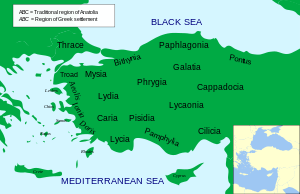Bithynian
| Bithynia (Βιθυνία) | |
|---|---|
| Ancient Region of Anatolia | |

Bithynia and Pontus as a province of the Roman empire
|
|
| Location | Northern Anatolia |
| State existed | 297-74 BC |
| Nation | Bithyni, Thyni, Thracian |
| Historical capitals | Nicomedia, Nicaea |
| Roman province | Bithynia |
 |
|
Bithynia (/bᵻˈθɪniə/; Greek Βιθυνία Bithynia) was an ancient region, kingdom and Roman province in the northwest of Asia Minor, adjoining the Propontis, the Thracian Bosporus and the Euxine Sea. It bordered Mysia to the southwest, Paphlagonia to the northeast along the Pontic coast, and Phrygia to the southeast towards the interior of Asia Minor. Bithynia was an independent kingdom from the 4th century BC. Its capital Nicomedia was rebuilt on the site of ancient Astacus in 264 BC by Nicomedes I of Bithynia. Bithynia was bequeathed to the Roman Republic in 74 BC, and became united with the Pontus region as the province of Bithynia et Pontus, in the 7th century incorporated into the Byzantine Opsikion theme. It became a border region to the Seljuk Empire in the 13th century, and was eventually conquered by the Ottoman Turks in the 1330s.
Several major cities sat on the fertile shores of the Propontis (which is now known as Sea of Marmara): Nicomedia, Chalcedon, Cius and Apamea. Bithynia also contained Nicaea, noted for being the birthplace of the Nicene Creed.
...
Wikipedia
